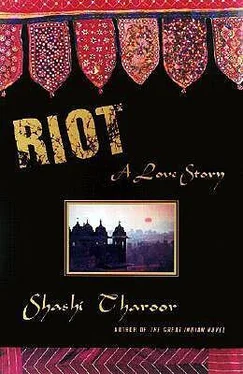She is silent now, but her fingernail moves on, to my side.
“That tickles,” I say.
“Shh,” she replies. “I’m writing something.” And her finger continues its elaborate curls and loops, stopping with a circled flourish. “Tell me what I wrote,” she says.
“I don’t know,” I respond. “I wasn’t aware you were writing till just now. The last letter was an O.”
She giggles. “It was a period, silly,” she says. “I’ll write it again.
Pay attention now.”
She props herself up on me, and I am dazzled by the gold of the sunlight in her hair. Her breasts are round and milky, their small nipples pinkly aureoled. It is difficult to concentrate on the letters she is now tracing across my trunk. But she is determined to make it easy for me, and her finger moves in exaggerated strokes, pausing after each letter to test my comprehension.
“I,” I say, and she nods delightedly. “L. O. U — no, V F? F?” She shakes her head, underscoring the third spoke of the E across my belly. “E. I love — V again. What’s this? I love Victor? Who’s Victor?” But I am laughing too much, and she tickles me mercilessly, so I am obliged to concede. “Y. Y. I get it.” Her exquisite finger draws a parabola that embraces my flabby belly, the hairs on my chest. “O.” And then she traces it again, beginning at my right shoulder blade, her finger gliding silken on my skin, rising to my left shoulder, failing only to complete the circle at the top. “U.”
“That’s right,” she says, and she is suddenly very serious, looking at me with that earnestness that struck me from the first as the hallmark of the expression with which she faced the world.
“I love you,” I conclude, with a smile.
“I thought you’d never say it,” she responds, but she is no longer looking so earnest. I bring her face down upon mine and kiss her so deeply that we are one body, one being, one breath.
“Wait — I have a message too,” I say at last. I roll her over on the mat so that she is on her back. The light illuminates her still-startling paleness. As I loom over her she stretches her arms, her fingers entwining behind my neck. “But I’m not going to use my finger.”
I bend and kiss each of her nipples. Then, slowly, gently, savoring each stroke, I trace the lines of my love with my tongue across the smooth velvet softness of her body. I cross the top and the bottom of my I, which confuses her at first, so I do it again, until she giggles with delight. My L begins with her right breast and ends at the bone above her left hip; my O takes in both nipples, now taut and redly rising; my V begins where my L had, descends till I have my nose buried in the soft blond down of her womanhood, then rises again, as she sighs, to end at her left breast; my E curves uninterruptedly like a Greek letter, my tongue a lambent caress, the middle prong of the letter quivering in her navel. By the time I am spelling out Y, O, U, she is moaning gently, her eyes closed, her legs parted beneath me, her breath shorter, but I am relentless, adding a T, its lower point plunging like a shaft into her moistness, and I have to do it again, because she is not expecting another word, and then she cries, “T,” with a purr of pleasure rarely associated with the enunciation of the alphabet, and I rush through the two Os that follow, because my need is urgent too, and we spell it out in unison, “I love you too,” our voices melding huskily with our bodies as I thrust myself into her.
And as I enter her I forget the roughness of the mat on the stone ledge in the alcove, as we move to our own rhythm I forget my wife, my work, my world, as her pelvis rises to meet mine I forget myself, and as she gasps in climax I burst into her like a flood, a flood of forgetting.
For there is so much to forget, as I he embracing her afterwards, my fingers in her silken hair, my other hand softly caressing the hollow just above her hip, that curve which so delights me in her body. What must I forget? Geetha herself, my wife of nine loveless years, mother of my much-beloved Rekha; my work, waiting for me at my neglected desk, my driver pacing outside the gate, wondering what the Sahib could be doing for so long in the Kotli; and, harder still to ignore, the mounting communal tensions in this benighted town. Priscilla is consolation, she is escape, but she is more than that: she is a fantasy come true, the possibility of an alternative life, as if another planet had flung its doors open for me.
What benevolent God has brought her here to me, in irredeemable Zalilgarh? I could not have invented Priscilla if she did not exist: her luminous beauty, her intelligence and sincerity of purpose, her complete openness to me, the way she gives so fully of herself. She is that rare combination of innocence and sexual freedom that I now think of as peculiarly American. She has come to do good, to bring enlightenment to the poor women of the area, to convert this small corner of India to what she sees as the right way to live, and somewhere in her engagement with this place she has found me.
And I have found her. There is nothing more important in my life than our twice-weekly assignations. Twice weekly, every Tuesday and Saturday just before sunset, as the dusk gathers around the Kotli like a shawl, we meet at the little secret room I had first taken her to (and first taken her in). We have had to agree on specific days and times in advance to reduce the visible communication between us, the peons bearing awkward notes, the stilted phone conversations always within earshot of others. And I look forward to Priscilla with barely suppressed excitement. Yes, excitement; the word is consciously chosen, because I have to admit I feel my anticipation between my legs as much as anywhere. Love has blossomed, too, but do we mean the same thing when we use the word? I cannot stop thinking of her; my days on the job are illuminated by images of her face and body and the memory of her touch. When I am with her I am in a constant state of exhilaration. I greet her with glee as she runs into my arms; I exult as she disrobes for me; I am ecstatic as we make — that word again — love.
Until Priscilla I had never really known the pleasure of sex.
Geetha lies stiffly, unmoving, as I go about what she sees as my business; she neither initiates nor welcomes, making it clear that she understands her amatory role as being to endure rather than to enjoy. She is not one for much foreplay, and she is often still dry when I enter her, her eyes tightly shut, her face contorted in something approaching a grimace. When it is over I move quickly off her, lightened by no great sense of satiation. She turns away from me, her duty done. Not surprisingly, we make love less and less frequently. Since Priscilla entered my life, I have slept with Geetha just once. Neither of us misses it.
“Make love” — I used that compound verb again. And yet how absurd to describe sex with Priscilla with the same words I use for Geetha! Sex with Priscilla is joy, it is celebration; she gives as much as she takes; her body moves with as much rhythmic energy as mine. The process of carnal discovery is an endless delight. She is willing to try everything, and I find myself doing things I had only read about in books, only imagined in the daydreams of a masturbatory adolescence. Afterwards we talk, we idly envisage a long-term future, we share poetry, but for all that, our evenings together are suffused with a lingering lust. I think of her at the office, at the dining table, in the field, and I am instantly aroused.
As a good Hindu I should have an instinctive awareness of the power and the pitfalls of sexual pleasure. The Vedas, the Puranas, so many of the ancient sacred texts of my faith emphasize kama, sexual desire; it is the primordial urge, the first seed of human motivation, the progenitor of thought, the first of the four major goals of man — before wealth, religion, and salvation. Kama is even a god because desire is a sort of sacred energy. But it is precisely because Hinduism recognizes the power of kama that it teaches its adherents to suppress it, to store their energy by conserving their semen, to still their urges by turning to abstinence, meditation, and good works. Sexual desire, the old Hindu sages knew, was pleasurable but passing; it was a hindrance, not a help, in the great quest of man to break the eternal cycle of birth and rebirth.
Читать дальше












